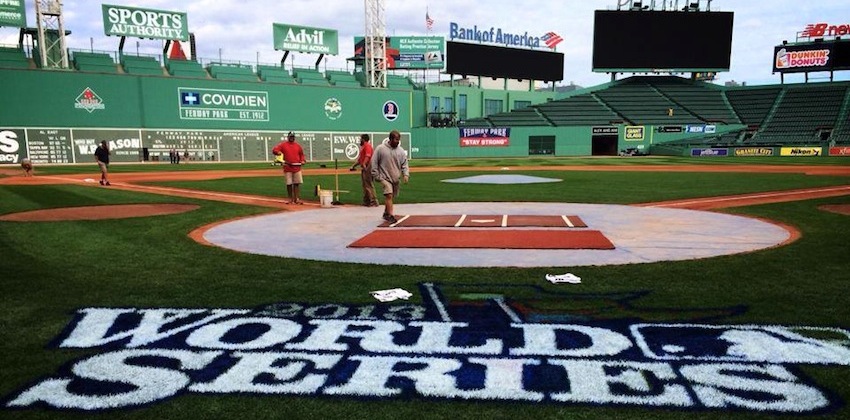Does the Red Sox World Series Home Field Advantage Matter?

PHOTO VIA RED SOX ON FACEBOOK
The World Series starts tonight (oh, by the way) and seemingly everyone with access to the internet wants to tell you how the series will be decided. While the pundits appear to be picking each team at roughly the same rate—15 members of a panel of 27 ESPN analysts and writers picked the Red Sox to win while 12 picked the Cardinals—they arrive at their conclusions using vastly different criteria. What’s surprising is how few considered home-field advantage. Indeed, only two members of the ESPN panel cite it in defense of their picks.
So we want to know: Should Red Sox fans take solace in the knowledge that the first two games, and potentially four of seven, will be played in Fenway Park? Intuitively, home-field advantage should increase a team’s chances of winning the World Series, and some research appears to support that conclusion. But is it that straightforward?
Both Keith Olbermann and Business Insider’s Nicholas Schwartz approached this subject at the All-Star break in 2012, which marked the 10th year of the current system by which the All-Star game determines which league-pennant-winner receives home-field advantage. They offered opposing opinions. Schwartz concluded that home-field advantage is surprisingly important, noting that 21 of the past 26 teams with home-field advantage have won the World Series and that the home team has won each of the past nine Game 7s. Meanwhile, Olbermann, the self-proclaimed “Baseball Nerd” wrote on his blog that, given the travel structure of the Series—two-three-two—unless the series goes to seven games, the team that begins with home-field advantage will actually play the same number of, if not more games on the road as it plays at home. In other words, series that are decided in four, five, or six games will not produce favorable circumstances for the team with “home-field advantage”. And further, despite the recent string of nine straight Game 7s won by the home team, looking at the entire modern era, hosts are just 19-17 in Game 7s.
So which is it? Does Olbermann’s argument that there is a “’Home Field’ farce” hold water?
While I hesitate to disagree with the Baseball Nerd, Olbermann’s argument does not account for the advantage gained by the team that wins the first game of a seven-game series—most likely the home team. According to Baseball Prospectus’s theoretical analysis, which assumes both teams are equal—a generally fair assumption for the World Series—the team that wins the first game of a seven-game series will go on to win the series 65.6 percent of the time. In reality, winning the first game of the Series has been even more fortuitous, as the team that has taken Game 1 has claimed 20 of the past 24 World Series. Of course, assuming that the home team is more likely to win Game 1 of the World Series presupposes some degree of home-field advantage, but even Olbermann is not arguing that home-field advantage does not exist whatsoever. Rather he takes issue with the degree to which home-field advantage is believed to affect a series. And his argument that the benefits of home-field advantage can be easily overstated is still probably fair.
Ultimately, however, when many analysts believe the Red Sox-Cardinals series will reach a seventh game, the issue of home-field advantage shouldn’t be ignored. Olbermann argues that there are confounding reasons why teams with home-field advantage have had so much success—primarily that they have simply been the better team. However, even if you assign those teams a 60 percent chance of winning the World Series to control for his claim—a stretch given that the winner of the All-Star game has determined home-field advantage since 2003—the probability that teams with home-field advantage won 21 of the past 26 World Series by pure chance is less than 1.5 percent. Is home-field advantage enough for a clearly inferior opponent to knock off the favorite? Probably not. But in a series where there is little to distinguish the two teams, the fact that the Red Sox have an opportunity to take Game 1 at home—where they won an American League-best 53 games during the regular season—and may play a seventh and decisive game at Fenway is significant. Just remember who you have to thank Red Sox fans, All-Star game MVP, Mariano Rivera, of course!


